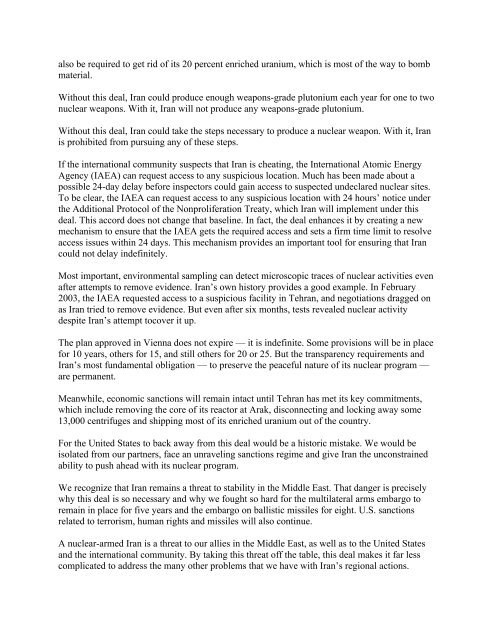WHAT YOU NEED TO KNOW ABOUT THE JCPOA
jcpoa_what_you_need_to_know
jcpoa_what_you_need_to_know
- No tags were found...
You also want an ePaper? Increase the reach of your titles
YUMPU automatically turns print PDFs into web optimized ePapers that Google loves.
also be required to get rid of its 20 percent enriched uranium, which is most of the way to bombmaterial.Without this deal, Iran could produce enough weapons-grade plutonium each year for one to twonuclear weapons. With it, Iran will not produce any weapons-grade plutonium.Without this deal, Iran could take the steps necessary to produce a nuclear weapon. With it, Iranis prohibited from pursuing any of these steps.If the international community suspects that Iran is cheating, the International Atomic EnergyAgency (IAEA) can request access to any suspicious location. Much has been made about apossible 24-day delay before inspectors could gain access to suspected undeclared nuclear sites.To be clear, the IAEA can request access to any suspicious location with 24 hours’ notice underthe Additional Protocol of the Nonproliferation Treaty, which Iran will implement under thisdeal. This accord does not change that baseline. In fact, the deal enhances it by creating a newmechanism to ensure that the IAEA gets the required access and sets a firm time limit to resolveaccess issues within 24 days. This mechanism provides an important tool for ensuring that Irancould not delay indefinitely.Most important, environmental sampling can detect microscopic traces of nuclear activities evenafter attempts to remove evidence. Iran’s own history provides a good example. In February2003, the IAEA requested access to a suspicious facility in Tehran, and negotiations dragged onas Iran tried to remove evidence. But even after six months, tests revealed nuclear activitydespite Iran’s attempt tocover it up.The plan approved in Vienna does not expire — it is indefinite. Some provisions will be in placefor 10 years, others for 15, and still others for 20 or 25. But the transparency requirements andIran’s most fundamental obligation — to preserve the peaceful nature of its nuclear program —are permanent.Meanwhile, economic sanctions will remain intact until Tehran has met its key commitments,which include removing the core of its reactor at Arak, disconnecting and locking away some13,000 centrifuges and shipping most of its enriched uranium out of the country.For the United States to back away from this deal would be a historic mistake. We would beisolated from our partners, face an unraveling sanctions regime and give Iran the unconstrainedability to push ahead with its nuclear program.We recognize that Iran remains a threat to stability in the Middle East. That danger is preciselywhy this deal is so necessary and why we fought so hard for the multilateral arms embargo toremain in place for five years and the embargo on ballistic missiles for eight. U.S. sanctionsrelated to terrorism, human rights and missiles will also continue.A nuclear-armed Iran is a threat to our allies in the Middle East, as well as to the United Statesand the international community. By taking this threat off the table, this deal makes it far lesscomplicated to address the many other problems that we have with Iran’s regional actions.


